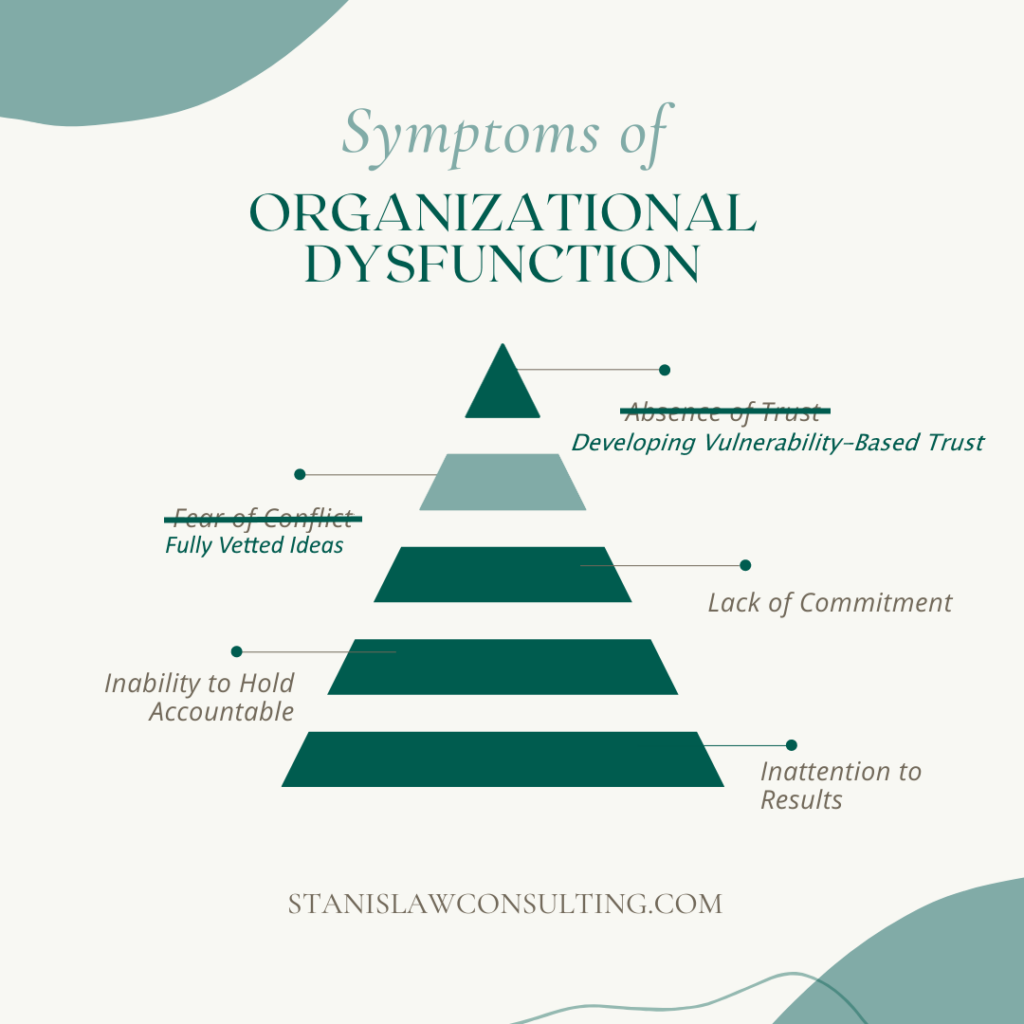If you want your team to work well together, you need to trust each other enough to disagree. Overcoming fear of conflict is a necessary step to erasing organizational dysfunction. Without it, your workplace culture can easily turn toxic as people become conflict avoidant just to hold on to their positions.
This is the second of a six-part blog series based on the book The Five Dysfunctions of a Team by Patrick Lencioni. You can read the first blog post here, and the second part here. Future blog posts will dive deeper into the remaining 3 symptoms of organizational dysfunction and provide you with tools for treating the symptoms and moving your team toward added productivity.
Get Help with Leadership, Conflict Resolution, and Business Strategy
Talk to a consultant who can help you make strategic decisions about the future of your business.
Is Your Team Afraid of Conflict?
Once your team has developed trust of one another, the next step away from organizational dysfunction comes from embracing conflict. Unfortunately, many workers today are conflict-avoidant. They have learned to keep their heads down and not make waves. Conflict avoidance is a coping mechanism designed to minimize fear. However, even after you have built trust among your team, you must then take additional steps to invite coworkers to rethink the way they approach conflict.
A timid approach to teamwork means that conflict-avoidant team members’ voices aren’t heard in brainstorming sessions and problem-solving meetings. Often introverted or quiet workers have unique insights into how their work gets done. However, they may be afraid of voicing those opinions because they are afraid of the consequences of conflict. To get the full benefit of their expertise and experience, you need to let them know that sometimes, conflict is a good thing.
Believe it Or Not,
Conflict is Good for Business
When teams are founded on trust, conflict becomes the pursuit of truth. Each member contributes to creating the best possible answer to the problems at hand. This means things will get uncomfortable, and different perspectives will clash. That’s a good thing. If team members never make one another uncomfortable in pursuit of the best solutions, then that means assumptions aren’t being challenged, and the way it has always been is the way it will continue to be, without question. That means it is up to the team leaders to demonstrate how conflict can be used to fully vet ideas and workshop processes. This will lead to the best team outcomes and allow you to move forward on your organizational goals.

Overcoming Fear of Conflict in Pursuit of Truth
To overcome fear of conflict and conflict-avoidant behavior on your team, you need to establish a new norm, where team members are expected to address the hard issues. As a leader, you need to model bringing up conflict-laden issues, rather than ignoring the elephant in the room. You should be inviting team members to provide commentary, even when that means they tell you your answer is wrong. Thank them when they challenge you and try to understand their perspective.
- Why do they think you are wrong?
- What information do they have that you don’t?
- What assumptions are you relying on?
- What will create the best product, process, or idea?
By unpacking that conflict, you can avoid future roadblocks and create a plan of action that will carry your team forward.
Get Help Overcoming Fear of Conflict and Addressing Organizational Dysfunction
Instituting new workplace norms where everyone on the team has a say can be hard. Especially if your employees are strongly conflict-avoidant, it may take work to overcome fear of conflict. You will need the help of a resourceful and emotionally intelligent facilitator to break down their resistance and get everyone to contribute to team brainstorming and problem-solving sessions. With a new pattern in place, you can chart a course for success where every member of your team is committed to playing their part.
David Stanislaw is an organizational development specialist with over 25 years’ experience in resolving organizational dysfunction. Through business consulting and facilitation, David helps businesses and teams improve productivity and team cohesion. Contact us to meet with David to move toward high organizational functioning today.


Recent Comments